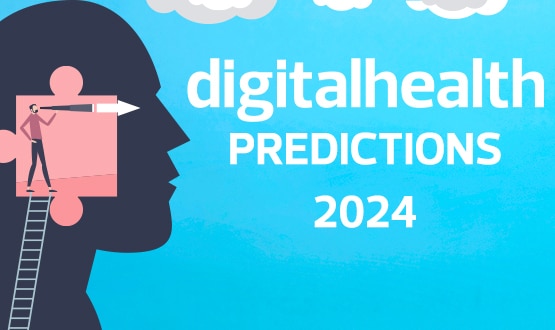2024 predictions: Health tech suppliers on what’s in store
- 28 December 2023

The year 2023 has once again been a significant one as the digital health world continues to develop and advance. We asked health tech suppliers what they think is in store in 2024. Here’s what they had to say:
Nick Wilson, CEO at System C
“We are on the brink of seeing advanced tools, such as AI, deployed in mainstream healthcare to boost operational efficiency. Integrated care systems, driven by joined-up data, will be crucial, particularly in coordinating health and social care. IT will play a significant role in this, ensuring the smooth transition of patients and preventing harm by standardising care and maximising efficiency.
“It is vital we effectively leverage clinical and operational data at the point of care to ensure providers are appropriately compensated for the services they deliver.
“In social care, the increasing financial pressures highlight the importance of transparency and predictability in cost management. Both health and social care must prioritise optimising existing investments and adopt a gradual approach to integrating technologies across local systems.
“By drawing insights from previous change initiatives and investing in people, the NHS and social care can fully capitalise on the potential benefits of technology”.
Jon Payne, director of sales engineering and education at InterSystems
“In 2024, the digital health industry is poised to undergo significant transformations, with several key themes and trends emerging. Interoperability continues to be a focus. As data sharing becomes more prevalent, the focus will be on creating a unified health record accessible across various platforms, improving care coordination and patient outcomes.
“Alongside this, we anticipate a surge in the use of predictive analytics and AI, aimed at enhancing clinical decision-making and personalised medicine.
“The role of cybersecurity in healthcare will also gain prominence, as the protection of sensitive health data is paramount in an ever-evolving digital landscape. Furthermore, the expansion of telehealth services will continue, propelled by the need for accessible healthcare, especially in remote areas.
“Finally, we expect to see a greater emphasis on user-friendly technology that simplifies rather than complicates healthcare processes, ensuring that innovations in digital health are accessible to all healthcare providers, regardless of their technical expertise.”
Jacob Haddad, CEO and co-founder of Accurx
“Going forward, the only way we see the NHS coping with increased demand and finding productivity gains within the current workforce capacity is to start using messaging to resolve patient requests outside of appointments.
“We need to be particularly careful that digitisation efforts don’t embed legacy and inefficient models of care delivery. As long as patients are automatically booked into appointments – even if their situation doesn’t require one – clinical time will be wasted and patients who do need appointments will face delays.
“GP practices have been developing this way of working over the past four years and are now managing more activity with a smaller workforce. We are now starting to see hospitals put this into practice with astounding results. We hope this will continue to gather momentum in 2024, and we’ll be putting all our efforts into helping NHS organisations get there.”
Dr Rachael Grimaldi, CEO and co-founder of CardMedic
“We’ve seen a number of reports in the last 12 months detailing heart-breaking incidences where a breakdown in communication has resulted in serious patient safety issues. Many NHS organisations are working tirelessly to protect against these situations, and the role of digital can help reduce risks.
“We’re delighted to see trusts and ICSs including digital in their journeys towards operational excellence, with solutions like CardMedic being built into standard operating procedure at University Hospitals Sussex, and within North East London ICS’s Equity and Equality Strategy.
“I think the year ahead will be defined by collaboration. The digital health innovation community is small but mighty, and programmes like the NHS Innovation Accelerator and Clinical Entrepreneur Programme have provided important footholds for ideas that will improve care for all without requiring millions in additional funding.
“Continuing to invest in such communities is crucial, so innovators can understand how to navigate and add value to the NHS.”
Jane Rendall, UK and Ireland managing director at Sectra
“Public cloud is now being put to the test in NHS diagnostic imaging, as 2023 draws to a close. 2024 will see the results emerge from early adopters, and with that, a distinct likelihood of accelerated uptake across NHS imaging networks, eager to embrace associated rapid deployments, scalability, cross-site collaboration, enhanced security and more.
“This will support the further break-down of historic silos, with conversations around the closer alignment of disciplines like cardiology into an increasingly integrated diagnostic enterprise imaging environment.
“And an almost aggressive agenda to scale imaging maturity frameworks, will see networks and ICBs leading the charge to better support diagnostic reporters and patients at a regional level. On their agenda: data driven decisions, equitable access for those in most need, and the delivery of mechanisms to embrace AI at scale where it can make most impact.”
Darren Ransley, managing director UK and Ireland at Better
“In 2024, I expect shared care records, in particular care planning, to be the digital asset that is at the forefront of regional leaders’ minds. In a similar way that we’ve witnessed ICSs mature at different paces over the last two years, the same has become apparent with shared care records.
“I hope re-branding the national programme to the connecting care records programme will bring fresh impetus for moving shared care records from the largely view-only systems they are today to dynamic bi-directional systems such as the London Care Record.
“For shared care records to provide maximum value, they must be built on platforms that enable the separation of data from applications and provide read-write access for all care professionals.
“The success of the London Care Record has been emphatically proven with £40m savings reported. A model, which, if repeated in other areas, could pave the way for the next big step forward in regional digital maturity.”
Rachael Fox, executive vice president, EMEA at Altera Digital Health
“As we approach a new year, we reflect on an eventful one for health tech. It was pleasing to see the NHS hit governments target for 90% EPR coverage by the end of 2023, especially in the context of technology budgets being reduced and the myriad of operational challenges that we have been facing, such as bed blocking and ambulance delays.
“Looking to 2024, becoming accustomed to the more challenging financial realities will be a top priority. It has been suggested that planned investment for frontline digitisation will be pulled and redirected to ICBs, with the remaining funding being reserved for the least digitised trusts.
“This kind of pragmatism is necessary for the system as a whole, but it places great pressure on trusts. While funding for tech is being diluted, ambitious targets remain. This is especially true for the 132 group two trusts, who still need to extend or configure their EPR to meet the core level of digitisation but who will receive no further funding.
“I predict that NHS trusts and ICBs will be seeking more cost effective solutions in order to continue making digital progress against this challenging financial backdrop.
“There isn’t the time or resource to opt for systems that take years to implement and extend, cause patient safety issues, and exhaust budgets. Flexible, configurable, and affordable solutions should take precedence, as they are the only ones suited to the NHS’ financial position in 2024.
“Additionally, having a flexible system in place will enable trusts to look to their EPR to tackle the other operational issues they are having, such as poor patient flow, and consider how it can interoperate with other technologies to tackle these problems.
“I hope 2024 is the year that we deprioritise suppliers that refuse to, or simply cannot interoperate. It is harmful to the system and most importantly, to patients.”
Mark Hindle, vice president, EMEA at Orion Health
“It’s going to be a busy year in the shared care records space. Every integrated care system has a shared care record in place, so NHS England is focused on making sure they are used. It also wants to see these records developed.
“ICSs have been asked to draw up plans for what is known as the minimum viable solution 2, and we will be helping our customers to achieve it. A third area of focus is sharing care plans through the National Record Locator Service. We’d like to see the NHS adopt another standard, the International Patient Summary, for sharing a minimum dataset for safe care.
“If it did, it would finally deliver on Tony Blair’s vision of data being available from Newcastle to Newquay. And that’s the big picture for 2024. We need to make sure shared care records have a sustainable funding model beyond the coming year, and that they are fully embedded in the health service.
“That means used for every care transaction, as the basis for population health initiatives, to empower patients, and to support the extension of treatment choice that both the Conservatives and Labour are advocating as we approach a general election.”
Dr Mark Ratnarajah, practising NHS paediatrician and UK managing director at C2-Ai
“A new understanding of the changing clinical risk of individual patients at-scale, will help to transform patient safety approaches in 2024. Trailblazing trusts and ICBs have received world-stage attention during the last 12 months, for impact delivered for patients on elective waiting lists.
“Using augmented intelligence, they have identified hidden high-risk patients, and have prioritised their treatment urgency or have supported them to wait well, based on a new understanding of their outcome trajectory.
“Results observed will see similar risk stratification become more widespread in 2024, and a deeper impact as ICBs use intelligence for system design, so that providers can configure and harness collective resource, instead of facing backlog challenges in isolation.
“Clinical risk adjustment – a term to encapsulate this expanding intelligence – has the potential to transform safety and historic business models in countless areas: from hospital acquired infections, to maternity, and even beyond health into the life sciences sector.”
Dr Anna-Karin Edstedt Bonamy, CEO at Doctrin
“AI and automation will continue to be a hot topic. However, for the NHS to reap its full benefits there needs to be a greater focus on identifying and automating the segments where providers can derive the most value with the least risk.
“Contrary to emerging views, this often lies beyond symptom assessment or automatic diagnosing. We’ve found from our work in primary care that it tends to be in patient-provider communications and care-coordination processes.”
“Another focus will be advancements to remote patient monitoring given the on-going pressures on services, which I hope leads to better integration with primary care solutions. It would not only benefit patients by simplifying their healthcare journey but also clinicians, as their workflows are improved and it becomes easier to collaborate.
“This shift could lead to a more streamlined, integrated, and efficient care process, enhancing healthcare delivery for both patients and providers.”
Michael Young, co-founder of Lindus Health
“Embracing AI will be imperative for pharma and biotech companies to stay innovative and competitive in 2024 and beyond.
“With enrolment being the textbook bottleneck to study completion, we’ll see machine learning technologies being used more frequently than ever before to recruit for studies by screening electronic health records (EHRs) to identify potential participants who meet specific eligibility criteria, as well as analysing historical data to optimise protocol and trial design to minimise barriers to participation wherever possible.
“AI tools will also be used for real-time data monitoring and querying, preventing roadblocks at critical milestones such as database lock and data delivery.
“Forward-thinking companies in this space are using AI to accelerate drug development and clinical trials – resulting in less time and money wasted on development and bringing much-needed therapies to patients faster.”





4 Comments
All very useful thank you. With the continuing emergence of ‘virtual’ this and that, including wards and hospitals, we are entering a new clinical era. Hopefully remote monitoring, particularly in cardiovascular conditions such as heart failure, will live up to expectations, in improving patients symptoms, quality of life and in reducing hospital admissions.
A Happy 2024 to everyone. All the collaborations and feedback is taking healthcare to a much better place. New technology like the Smartcardia patch are allowing highly conclusive diagnostics to be reviewed Live, in real-time both in the hospital, and out in the patients homes. Regular screening earlier, leading to prevention, will reduce the burdens on health and finances.
Would be interested to hear what the main EPR suppliers think? Epic, Meditech, Oracle.
HNY 2024 – I like this article. thank you.
https://2024year.com/
Comments are closed.